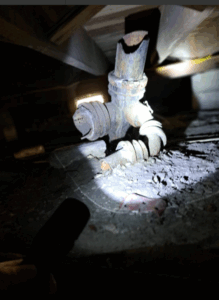
 By Forscher Property Inspections – Your Trusted Home Inspector in Pinellas, Pasco, and Hillsborough Counties
By Forscher Property Inspections – Your Trusted Home Inspector in Pinellas, Pasco, and Hillsborough Counties
Introduction: Why Plumbing Shouldn’t Be an Afterthought
When you’re buying a home and doing a home inspection Tampa Bay, there’s a lot to consider: location, layout, curb appeal—but what about the plumbing? Hidden behind the walls and beneath the floors, your home’s plumbing system is one of the most critical and costly systems in the house.
At Forscher Property Inspections, we’ve seen it all—rusted-out galvanized pipes in homes from the 1960s, copper pipes with pinhole leaks, problematic PEX installations, and tree roots clogging sewer lines. If you want to avoid a five-figure plumbing disaster, a thorough plumbing inspection during your home buying process is essential.
2. Why Plumbing Matters in a Home Inspection
Your home’s plumbing affects every aspect of daily life—from clean water supply to waste drainage. A failing system can mean:
-
Expensive repairs
-
Water damage
-
Mold growth
-
Health hazards
-
Reduced resale value
As part of every standard home inspection in Pinellas, Pasco, and Hillsborough counties, we assess visible plumbing components. In older homes especially, hidden issues may exist that require further inspection—particularly with sewer lines and septic systems.
3. How Long Do Galvanized Pipes Last?
Galvanized steel pipes were widely used in American homes until the 1960s. These pipes are steel coated in a layer of zinc to prevent rusting. Unfortunately, over time:
-
The zinc erodes.
-
Rust builds up inside.
-
Water pressure drops.
-
Leaks form.
-
Discolored water may occur.
Average Lifespan:
Galvanized pipes last about 40 to 60 years. Homes built before 1965 with original plumbing likely have these.
What We Look for During a Home Inspection:
-
Rust stains at joints
-
Water discoloration
-
Poor water pressure
-
Aging supply lines under sinks or water heaters
Recommendation:
If you’re buying a home in Tampa Bay built before 1970, request a plumbing inspection or ask if the plumbing has been updated. Replacing galvanized pipes can cost thousands—but waiting for a failure costs even more.
4. How Long Do Copper Pipes Last—and Why Sometimes Less
Copper has long been the gold standard of residential plumbing. It’s durable, non-toxic, and resistant to corrosion—at least in the right conditions.
Average Lifespan:
-
Thin-walled copper (Type M): 20–40 years
-
Thicker Type L copper: 50+ years
-
Type K (used underground): 75+ years
But here’s the catch: water quality matters. In some parts of Florida, acidic water or water with high chlorine content can accelerate corrosion in copper.
Why Copper Pipes May Fail Early:
-
Pinhole leaks from corrosion
-
Dezincification in brass fittings
-
Improper installation
-
Electrolysis from contact with dissimilar metals
What We Look for in a Home Inspection:
-
Green stains on pipe joints
-
Signs of corrosion under sinks
-
Leaks around fittings
-
Water pressure issues
Recommendation:
If the home uses copper piping and is over 30 years old, ask the seller or agent about pipe upgrades or any known leaks.
5. Is PEX Plumbing Fine? Understanding the Lawsuits and Today’s Standards
PEX (cross-linked polyethylene) exploded in popularity in the 1990s and early 2000s. It’s flexible, affordable, and easy to install. But it had a rocky start.
The Lawsuit Era:
Several early PEX systems failed due to:
-
Defective fittings (especially brass ones with high zinc content)
-
Pipe degradation from UV exposure
-
Poor quality control in early manufacturing
Resolved or Not?
Yes—the lawsuits largely wrapped up around 2013–2015. Today’s PEX is markedly improved, with better manufacturing and stricter code compliance.
Benefits of PEX Today:
-
Resistant to freeze-breakage
-
Cheaper and faster to install
-
Flexibility reduces the number of joints (less chance of leaks)
-
No corrosion
Potential Drawbacks:
-
May not be allowed for outdoor use (UV-sensitive)
-
Rodent damage risk
-
Some insurance companies may still ask questions
What We Inspect:
-
Crimp connections
-
Pipe color (red, blue, white – for hot/cold)
- Pipe condition near the water heater and under sinks
6. Is PVC Plumbing Good and Why?
PVC (polyvinyl chloride) and CPVC (chlorinated PVC) are commonly used in Florida homes for both drain lines and sometimes hot water supply.
Why PVC Is Good:
-
Inexpensive and readily available
-
Resistant to corrosion
-
Smooth interiors prevent clogs
-
Long lifespan (50–80 years)
-
Easy to replace sections
When It’s Not So Good:
-
Not rated for hot water (unless CPVC)
-
Can become brittle with age or sun exposure
-
Improper installation (poor gluing) can cause joint failures
What We Look for:
-
Signs of leaks at joints
-
Support and alignment
-
Transition connections between materials
Recommendation:
Properly installed PVC/CPVC is a reliable system. Always ask if a licensed plumber handled the work—DIY installs are often problematic.
7. Why You Need a Sewer Line Inspection Before Buying a Home
Even if everything looks fine in the house, problems often lie deep underground—in the main sewer line connecting the home to the city sewer system.
Common Sewer Line Issues in Tampa Bay:
-
Tree root intrusion (especially in older neighborhoods)
-
Cracked or collapsed clay or cast iron pipes
-
Pipe sags (bellies)
-
Grease or scale buildup
-
Blockages from debris or wipes
Who Needs a Sewer Scope?
-
Any home built before 1980
-
Homes with mature trees nearby
-
Homes with slow drains or gurgling toilets
How It Works:
A sewer scope involves a small camera fed through the main drain cleanout to visually inspect the line. We recommend licensed plumbing contractors for this, but at Forscher Property Inspections, we advise every buyer when a sewer scope is warranted.
8. Septic System Inspections: Don’t Skip This Step If You’re Off the Grid
If your potential new home isn’t on city sewer, it relies on a septic system—a private underground wastewater treatment setup that needs proper care.
Why Septic Inspections Matter:
-
The average septic repair costs $3,000 to $7,000+
-
Replacing a drainfield can cost $10,000+
-
Failures often cause groundwater contamination
What’s Included in a Septic Inspection:
-
Locating and uncovering tank
-
Checking tank condition and sludge level
-
Verifying flow to drainfield
-
Inspecting for backups or odors
We always recommend hiring a licensed septic contractor before closing. A standard home inspection won’t include tank pumping or scoping unless arranged separately.
9. Real Estate Agents: Plumbing Problems Can Kill a Deal—Help Your Buyers Stay Ahead
A failed sewer line or aging galvanized plumbing can derail closings or destroy your buyer’s confidence. Agents who proactively suggest:
-
Sewer line inspections
-
Septic tank evaluations
-
Plumbing upgrades
…build trust and protect everyone’s interests. At Forscher Property Inspections, we work closely with real estate agents across Pinellas, Pasco, and Hillsborough counties to provide clear, non-alarming insights buyers can understand.
10. How Forscher Property Inspections Checks Plumbing the Right Way
With over 20 years of experience and 10,000+ inspections completed, we know how to spot issues and explain them clearly. Here’s how we assess plumbing:
-
Water pressure and flow testing
-
Visual inspection of all exposed piping (under sinks, in attics, at the water heater)
-
Inspection of fixture function (toilets, faucets, tubs)
-
Drainage performance
-
Recommendations for further sewer or septic evaluations
We provide detailed, photo-supported reports within 24 hours and offer same-day service when needed.
11. Final Thoughts: Don’t Get Soaked—Inspect Before You Invest
The best time to uncover a plumbing problem is before you buy the home—not after. Whether it’s aging galvanized supply lines, suspicious copper corrosion, early-generation PEX, or an unseen sewer backup, plumbing issues can cost thousands.
At Forscher Property Inspections, we don’t just inspect—we help you understand the full picture. Our goal is to give you peace of mind, not panic, with clear, honest assessments.
Schedule Your Plumbing-Smart Home Inspection Today
📍 Serving Pinellas, Pasco, and Hillsborough Counties
📞 Call: 818-599-0900
🌐 Visit: forscherpropertyinspections.com
